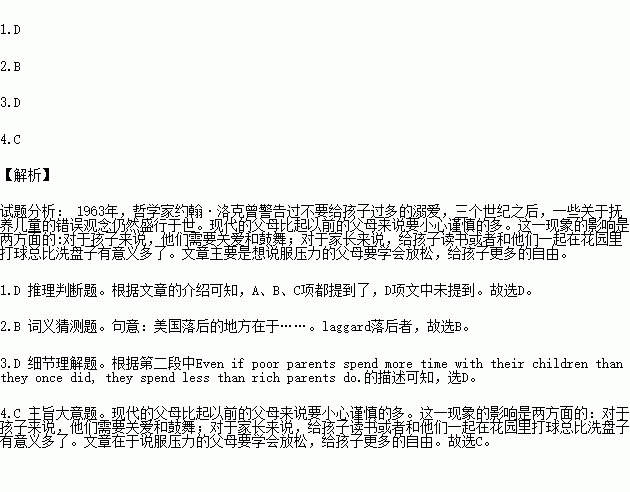题目内容
In 1693 the philosopher John Locke warned that children should not be given too much “unhealthy fruit” to eat. Three centuries later, misguided ideas about child-raising are still popular. Many parents fear that their children will die unless ceaselessly watched. In America the law can be equally paranoid (偏执的). In South Carolina this month Debra Harrell was jailed for letting her 9-year-old daughter play in a park unsupervised (无人监督的).
Her severe punishment reflects the rich world’s worry about parenting. By most objective measures, modern parents are far more conscientious (认真的) than previous generations. Dads are more hands-on than their fathers were, and working mothers spend more time nurturing their children than the housewives of the 1960s did. However, there are two problems in this picture, connected to class. One is at the lower end. Even if poor parents spend more time with their children than they once did, they spend less than rich parents do. America is a laggard here: its government spends abundantly on school-age kids but much less than other rich countries on the first two or three years of life. If America did more to help poor parents with young children, it would have huge returns.
The second one, occurs at the other end of the income scale, and may even apply to otherwise rational (理性的) Economist readers: well-educated, rich parents try to do too much. Safety is part of it—they fear that if they are not constantly watching their children may break their necks, which is the least rational. Despite the impression you get from watching crime dramas, children in rich countries are safe, so long as they look both ways before crossing the road. The other popular parental fear—that your children might not get into an Ivy League college—is more rational. Academic success matters more than ever before. But beyond a certain point, parenting makes less difference than many parents imagine. Studies in Minnesota and Sweden, for example, found that identical twins grew up equally intelligent whether they were raised together or apart. A study in Colorado found that children that adopted and raised by brainy parents ended up no brainier than those adopted by average parents.
This doesn’t mean that parenting is irrelevant. The families who adopt children are carefully screened, so they tend to be warm, capable and middle-class. But the twin and adoption studies indicate that any child given a loving home and adequate stimulation is likely to fulfill her potential. Put another way, better-off parents can afford to relax a bit. And if you are less stressed, your children will appreciate it, even if you still make them eat their fruit and vegetables.
1.Which of the following statements is NOT a misguided idea of parenting mentioned in the passage?
A. Children should be protected from any dangers by their parents.
B. The more conscientious parents are, the more children will surely benefit from parenting.
C. Children will die unless ceaselessly watched.
D. Children are likely to fulfill their potential with a loving home and adequate stimulation.
2.The underlined word “laggard” in Paragraph 2 probably means a country that ________.
A. is ahead in development
B. falls slow behind others
C. is free from physical or mental disorder
D. moves to a higher position
3.Which of the following can we learn from the passage?
A. Only warm, capable and middle-class people can adopt a child.
B. When it comes to child-raising, Economist readers will become more rational.
C. Children in rich countries are in greater danger due to the bad influence of crime dramas.
D. Although poor parents spend more time with their kids than they once did, they spend less than rich parents do.
4.This passage is mainly written to ________.
A. urge American laws concerning parenting to be changed
B. advise modern parents to learn from their previous generations
C. persuade stressed parents to learn to relax and give more freedom to their children
D. call on the government to do more to help poor parents with school-age children
 A加金题 系列答案
A加金题 系列答案 全优测试卷系列答案
全优测试卷系列答案
